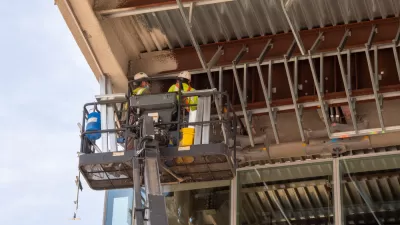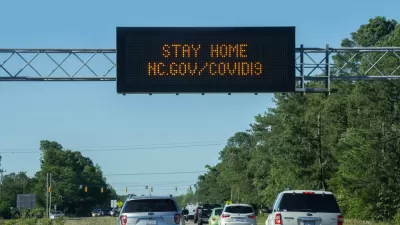The changes coming to the construction industry to protect the safety and health of workers during the pandemic could stay in place for the foreseeable future.

When the pandemic first hit, two approaches to construction work emerged. In one kind of place, most notably Boston, construction work was suspended indefinitely. Other places, like California, included construction work in the category of essential, and even accelerated project timelines with fewer cars on the road. For the first two months of the public health crisis, the construction industry lacked clear direction on the requirements of a safe and healthy construction site. Now, however, more companies are moving forward construction with strict regulations enforced by state and local authorities, and the requirements of safe construction in the time of COVID-19 are beginning to emerge. These new regulatory standards could end up sticking around as the new normal for the industry for the foreseeable future, or they could end up requiring a complete overhaul in the near term if workers begin to encounter the kind of outcomes currently ravaging workers in other sectors of the economy.
Jenn Goodman writes to provide some details on what the future of the construction industry will look like during and after the public health crisis, as the industry plans for long-term changes. "This emphasis on cleaner, less crowded work areas is one that won’t recede after the virus does," writes Goodman.
"The new normal will be reinforced by state, local and federal regulations, such as the ones recently proposed in Washington and Pennsylvania, and in the near future, OSHA could require employers to develop written infectious disease preparedness and response plans, said attorney Michael Rubin, chair of Goldberg Segalla’s national OSHA and Worksite Safety practice group," adds Goodman.
Other predictions included in the article about the new normal in the construction industry: remote work and teleworking will be much more common, and many projects are likely to take longer.
For additional reporting on the public health concerns that linger as construction sites begin to reopen, see also articles by Jonathan Hilburg and Mathew Haag that focus especially on the resumption of construction work in New York City.
FULL STORY: The new normal: 8 ways the coronavirus crisis is changing construction

Planetizen Federal Action Tracker
A weekly monitor of how Trump’s orders and actions are impacting planners and planning in America.

Congressman Proposes Bill to Rename DC Metro “Trump Train”
The Make Autorail Great Again Act would withhold federal funding to the system until the Washington Metropolitan Area Transit Authority (WMATA), rebrands as the Washington Metropolitan Authority for Greater Access (WMAGA).

DARTSpace Platform Streamlines Dallas TOD Application Process
The Dallas transit agency hopes a shorter permitting timeline will boost transit-oriented development around rail stations.

Renters Now Outnumber Homeowners in Over 200 US Suburbs
High housing costs in city centers and the new-found flexibility offered by remote work are pushing more renters to suburban areas.

The Tiny, Adorable $7,000 Car Turning Japan Onto EVs
The single seat Mibot charges from a regular plug as quickly as an iPad, and is about half the price of an average EV.

Supreme Court Ruling in Pipeline Case Guts Federal Environmental Law
The decision limits the scope of a federal law that mandates extensive environmental impact reviews of energy, infrastructure, and transportation projects.
Urban Design for Planners 1: Software Tools
This six-course series explores essential urban design concepts using open source software and equips planners with the tools they need to participate fully in the urban design process.
Planning for Universal Design
Learn the tools for implementing Universal Design in planning regulations.
Municipality of Princeton
Roanoke Valley-Alleghany Regional Commission
City of Mt Shasta
City of Camden Redevelopment Agency
City of Astoria
Transportation Research & Education Center (TREC) at Portland State University
US High Speed Rail Association
City of Camden Redevelopment Agency
Municipality of Princeton (NJ)





























